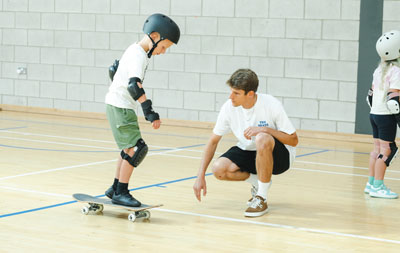
by Jack Francis
The Skate Club
How passion helps neurodiverse children discover their ‘superpowers’
A few months ago, I stood in front of 200 primary school children, sharing stories from my life – skateboarding down hills with Christmas trees strapped to my board, struggling to keep up at university and writing a book I never thought I’d be able to write. As I spoke, a boy turned to his mate and whispered, “I’ve got ADHD and dyslexia – like him.” That moment stuck with me. That small moment of recognition, pride even, is why I’ve been doing these assemblies.
I was diagnosed with dyslexia at university, and ADHD much more recently, as an adult running a skate school. Growing up, these weren’t framed as ‘superpowers’. At best, they were obstacles. At worst, signs of somehow falling short. I’d often been called bright, but that made it harder – like I had all the pieces, just not the ability to put them together.
It’s only in recent years that I’ve come to see how much of what I’m good at – from teaching, to coaching, to running a business – is tied to the way my brain works. My hyperfocus, creativity, energy and problem-solving skills aren’t things I’ve achieved despite my neurodiversity. They are my neurodiversity. And I’m not alone.
The power of passion
In every school I visit, there are children sitting quietly with heads full of big ideas, or legs bouncing under the table. Some have diagnoses, many don’t. They might struggle with reading, listening, or managing frustration – but the potential in those children is massive. What they need isn’t ‘fixing’. What they need is space to explore something they care about, something that lets them feel good at being themselves. For me, that thing was skateboarding.
Skateboarding gave me freedom. It wasn’t about winning or being picked for a team. It was about solving tiny physical puzzles – how to move, how to balance and how to land a trick. It was social but low-pressure. I could focus completely on what I was doing, fail over and over again and still feel proud of the progress. Looking back, skateboarding was the first place I truly felt capable.
Today, as a skate coach, I see the same thing in other children – especially those who are neurodiverse. Children who are anxious or fidgety, or who’ve been told they “Just need to focus,” often find a rhythm through skating. I’ve watched children go from nervously standing on a board to rolling down ramps on their own, grinning from ear to ear. Some of them go home and do their reading for the first time in weeks. It’s not about the trick – it’s about the shift in how they see themselves.
Reframing ‘difficulty’
One of the challenges for neurodiverse children today is that their journey often begins with being told what they can’t do. A diagnosis, helpful as it is, can also carry an unspoken message: you’re going to struggle. And yes, there may be challenges. But there are also advantages – and children deserve to hear that side too.
Dyslexic thinkers often have strong visual and spatial awareness, creative imagination and big-picture thinking. Those with ADHD may have intense focus (on the right task), incredible energy and rapid-fire ideas. Autistic children often bring attention to detail, emotional honesty and deep interests. But these traits only shine when we let children follow what they love.
That’s the heart of it: when a child finds their passion – whether it’s skateboarding, coding, storytelling or animals – it becomes a doorway into confidence. Passion gives purpose to their focus, structure to their energy and joy to their learning. And when a child starts seeing themselves as someone who can, not just someone who struggles, everything changes.
The adult’s role
As parents, educators, and carers, our role isn’t to tell children who they are – it’s to notice when they light up, and to help them follow that thread. Sometimes that means letting them try unusual things. Sometimes it means not pushing them to do what everyone else is doing. And sometimes it just means listening when they talk about something they care about.
Skateboarding might not be your child’s thing – and that’s fine. But something is. There’s something out there that lets them feel free, focused and fully themselves. Our job is to help them find it. Not to demand they perform, but to offer them the kind of support that says, “You’re not broken – you’re just different and that’s a strength.”
I still get overwhelmed. I still struggle with admin. I still forget things. But I’ve also built a skate school, written a book and coached hundreds of young people. And I’ve done that not in spite of my neurodiversity, but because of it.
So when your child gets obsessed with something, try not to brush off. Watch closely. That might just be the spark that helps them discover their superpower.
Jack Francis is the founder of The Skate Club and author of “How to Train Your Skateboard”, a beginner’s guide to skateboarding.
www.theskateclub.com











